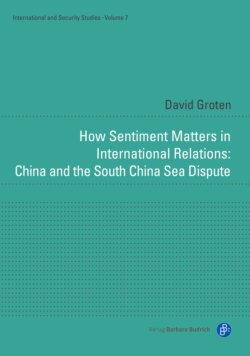Читать книгу How Sentiment Matters in International Relations: China and the South China Sea Dispute - David Groten - Страница 29
На сайте Литреса книга снята с продажи.
2.3.5 References to Dominant National Identity Narratives
ОглавлениеTo reiterate, studies of social and political psychology (recognition, justice and status research) have shown that acknowledgment and verification of an actor’s distinctive identities, reflected in an external interaction partner’s [55] behavior, determine whether that conduct is regarded as respectful or not76. As the PRC has been, and perhaps still is, facing a critical period of national identity-formation77 (chapter 4.1), it is argued that in such a period collective actors are particularly dependent on external respect through confirmation of their self-defined identity78, not least as it serves as some kind of reassurance of its own significance (Ringmar, 1996, 2002). In anticipation of the results of the qualitative content analysis (QCA), four national identity79 narratives appear to dominate Chinese foreign policy discourses in general:
- China, the exceptional country (achievements, merits, culture, history),
- China, the victim (of foreign intervention and oppression),
- China, the harmonious country,
- China, pursuing the Chinese Dream.
These narratives all relate to respect concerns in one way or another. For instance, comments by Chinese scholars stressing China’s exceptionalism can, depending on the context, be interpreted as respect expectations. Accordingly, conduct perceived as violating China’s self-defined identity (or significant parts thereof) is regarded as a disrespect experience80. Furthermore, reconciling with the upcoming indicator (emotional critique), such perceived misrecognition is likely to arouse negative emotions such as anger, contempt, aggression and frustration (Lindemann, 2010; Ringmar, 1996; Taylor, 1991). For instance, a sense of victimhood is likely to be associated with a feeling of injustice and frustration capable of negatively affecting China’s status and self-worth. In this vein, conduct regarded as an attempt to slow down or halt China’s rise is a possible example of such inadequacy81. Moreover, a sense of [56] victimhood usually demonstrates that other parts of Chinese identity narratives, such as harmonious country and the Chinese Dream, are neglected or misinterpreted at the same time. In addition, ‘impression management’82 by Chinese FPTTs, for instance, manifested by a constant and strong emphasis on China’s benign intent and its positive image, may signal identity misrecognition as well. In total, this fourth respect indicator seeks to scrutinize frequent identity references and the context in which they occur in order to spot underlying disrespect experiences.
